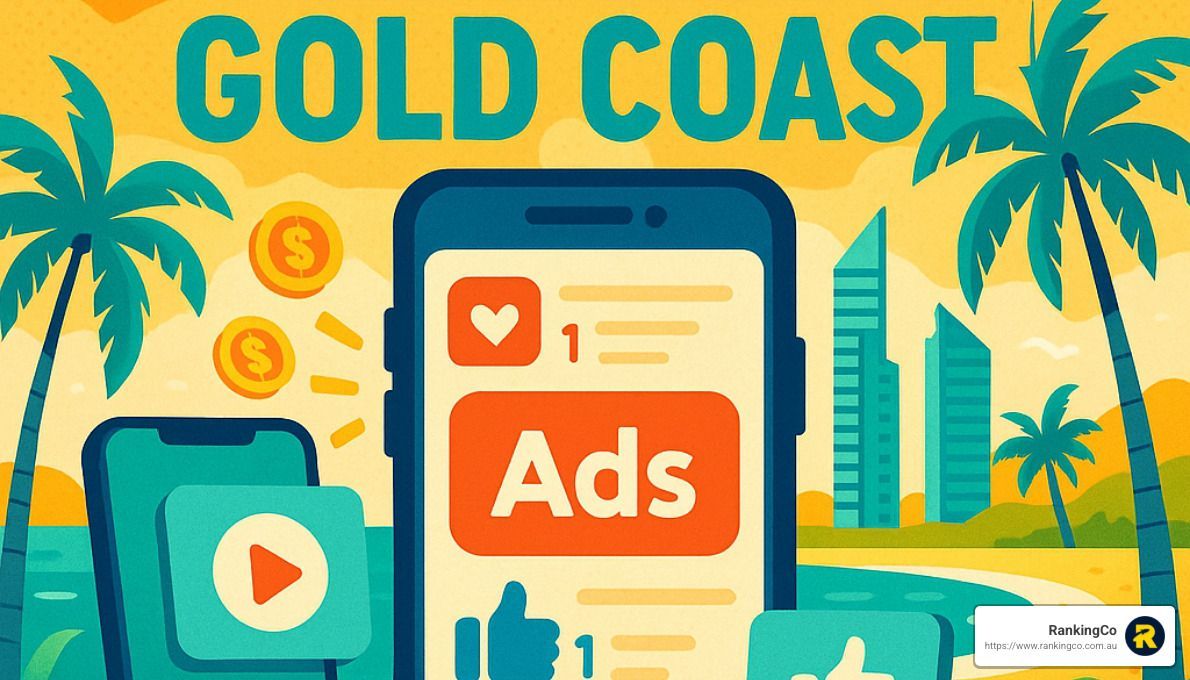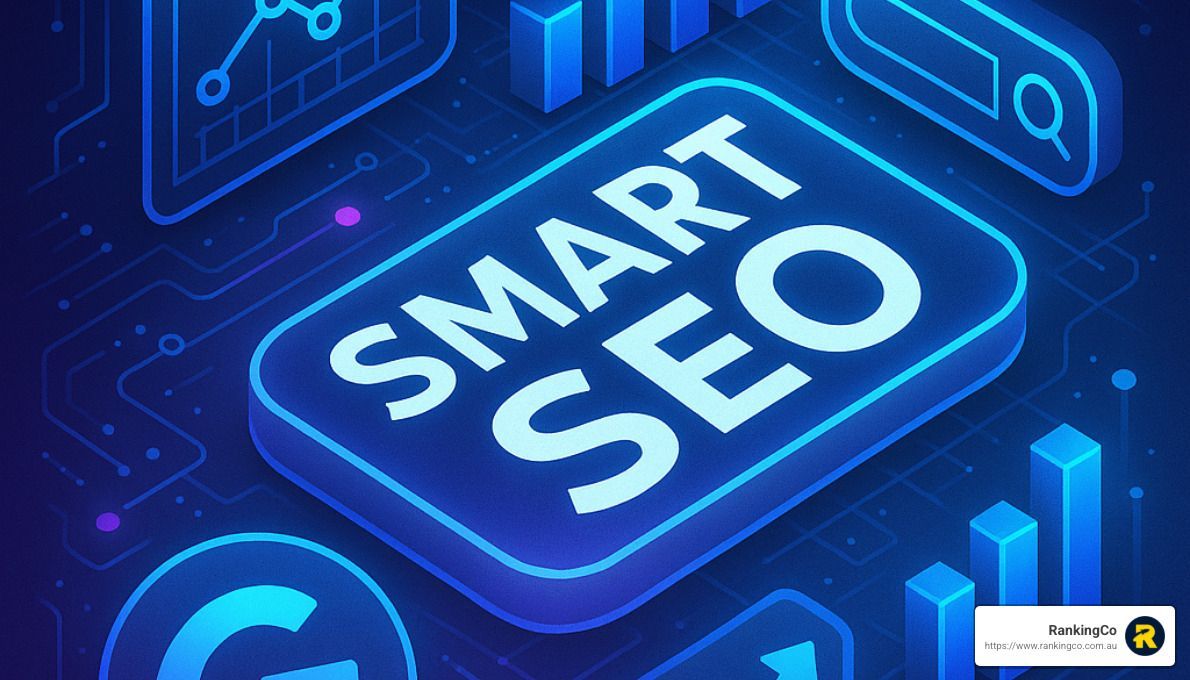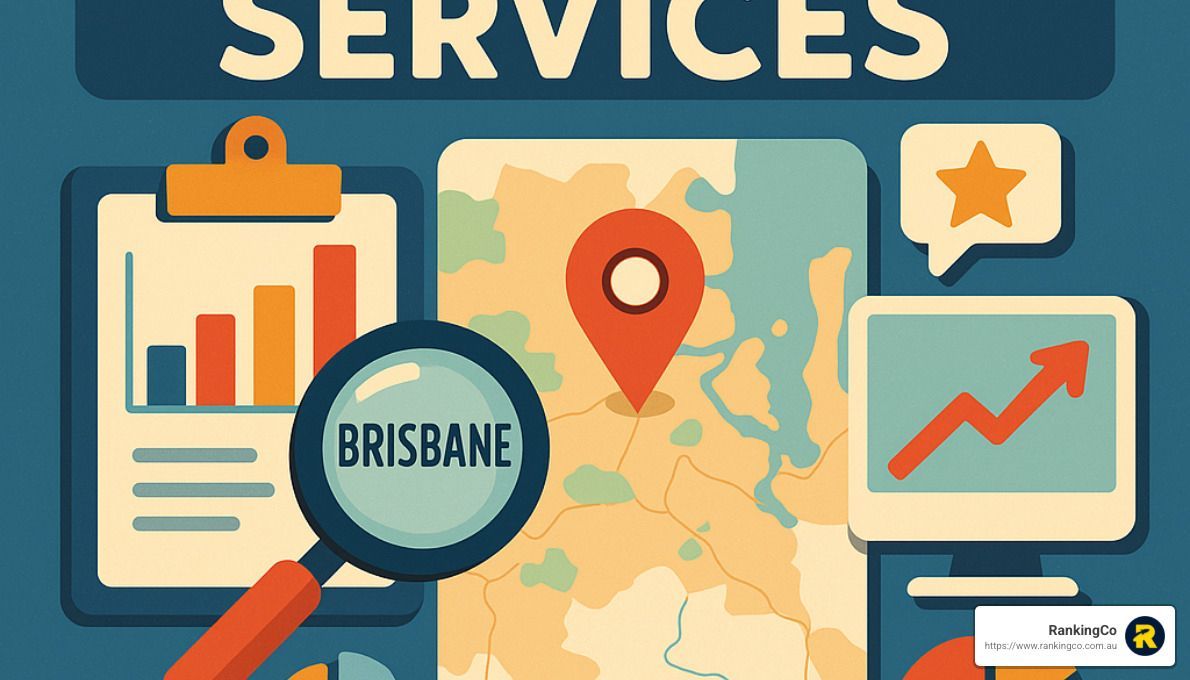Effective Digital Marketing Strategies: Your Blueprint for Success
Effective digital marketing strategies are essential for businesses aiming to thrive in today's digital landscape. At its core, an effective digital marketing strategy involves using diverse channels to connect with the right audience, optimise resources, and ultimately drive business growth. To get started with an effective approach, consider the following key factors:
- Set clear, measurable goals to guide your marketing efforts.
- Identify and understand your target audience through data analysis.
- Leverage multiple digital channels including social media, email marketing, content marketing, and SEO to maximise reach.
- Track and adjust strategies based on performance metrics to ensure optimal results.
By tailoring a strategy that suits your specific business needs, you can foster better brand visibility and higher engagement with your target market.
My name is Amber Porter, co-founder of RankingCo. With years of experience crafting effective digital marketing strategies for businesses of all sizes, I've seen the transformative power of thoughtful planning and execution. Join me as we explore proven methods to improve your digital presence and achieve your business goals.
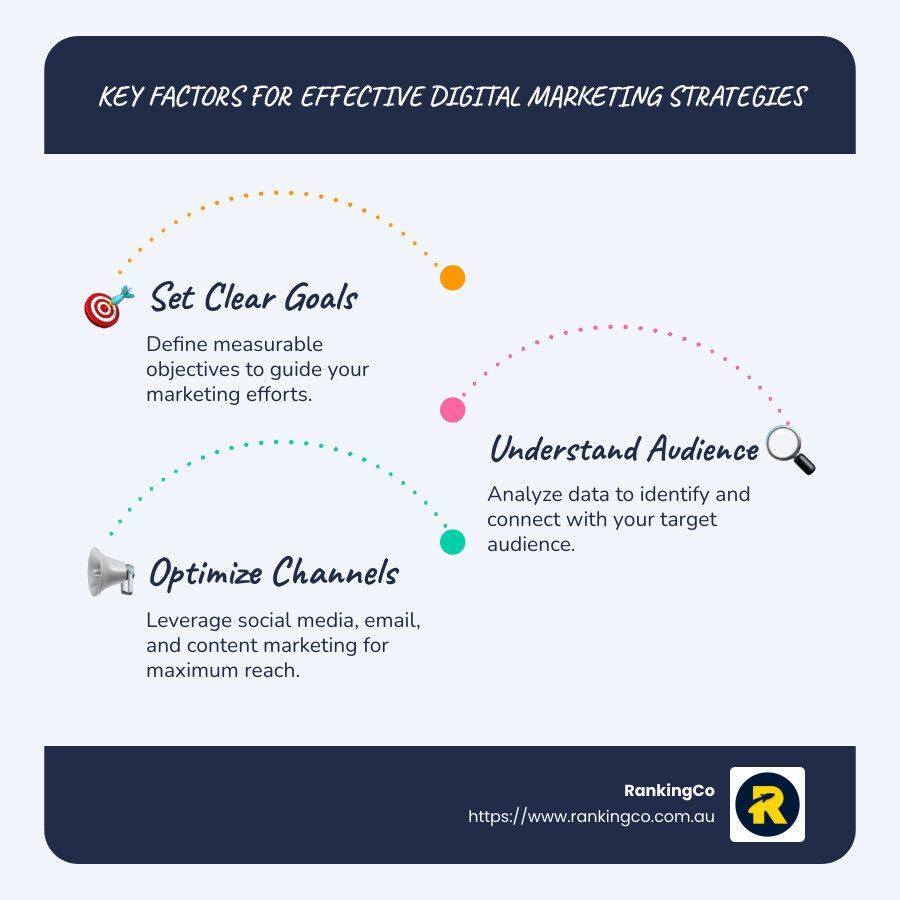
Understanding Digital Marketing Strategies
Digital marketing strategies are essential for reaching your business goals. They help you connect with your target audience and make the most of various digital channels. Let's break it down into simple steps.
Digital Channels
Digital channels are the platforms you use to connect with your audience. These include social media, email, search engines, and more. Each channel has its unique strengths, and the right mix depends on where your audience spends their time. For instance, if your target market is primarily on Instagram, focusing efforts there makes sense.
Business Goals
Setting clear business goals is crucial. Are you looking to increase brand awareness, generate leads, or boost sales? Your goals will guide your strategy and help you choose the right channels and tactics. Goals should be specific, measurable, achievable, relevant, and time-bound (SMART).
Target Audiences
Understanding your target audience is vital. Gather data on demographics, interests, and online behavior. This insight helps tailor your messaging and choose the most effective platforms. As highlighted in the research, segmenting your customers into groups can provide personalised experiences, boosting engagement and conversion rates.
Integration and Optimization
An effective digital marketing strategy isn't static. It's about integrating various channels and continuously optimizing based on performance data. Use tools like Google Analytics to track key metrics and adjust your approach as needed.
By understanding these core elements, you can build a digital marketing strategy that aligns with your business objectives and resonates with your audience. This sets the stage for deeper engagement and success in the digital world.

Key Components of Effective Digital Marketing Strategies
Creating an effective digital marketing strategy involves several key components. These elements ensure your efforts align with your business goals and resonate with your audience. Let's explore the essentials: goals, audience, budget, and metrics.
Goals
Setting clear and actionable goals is the foundation of any successful digital marketing strategy. These goals should be SMART: specific, measurable, achievable, relevant, and time-bound. For example, if your aim is to increase website traffic by 20% over the next quarter, this goal provides a clear target and timeframe.
Pro Tip: Align your marketing goals with broader business objectives. If your business aims to expand in Brisbane, focus on local SEO and targeted advertising to reach that specific market.
Audience
Understanding your audience is crucial. This involves gathering data on demographics, interests, and online behaviors. Knowing where your audience spends time online helps you select the right channels to reach them. For instance, if your target demographic is young adults, platforms like Instagram and TikTok might be more effective.
Segmentation is a powerful tool here. By dividing your audience into smaller groups based on shared characteristics, you can tailor your messaging to each segment, leading to higher engagement and conversion rates.
Budget
Budgeting is a critical component of digital marketing strategy. It involves determining how much you can spend and how to allocate funds across various channels. Consider the cost-effectiveness of each channel and prioritise those that yield the highest return on investment (ROI).
Example: If your social media ads perform better than PPC campaigns, consider reallocating more budget to social media advertising. This strategic shift can improve your ROI and ensure funds aren't wasted on less effective channels.
Metrics
Metrics are essential for measuring the success of your digital marketing efforts. Key performance indicators (KPIs) such as click-through rates, conversion rates, and customer lifetime value help gauge the effectiveness of your strategies.
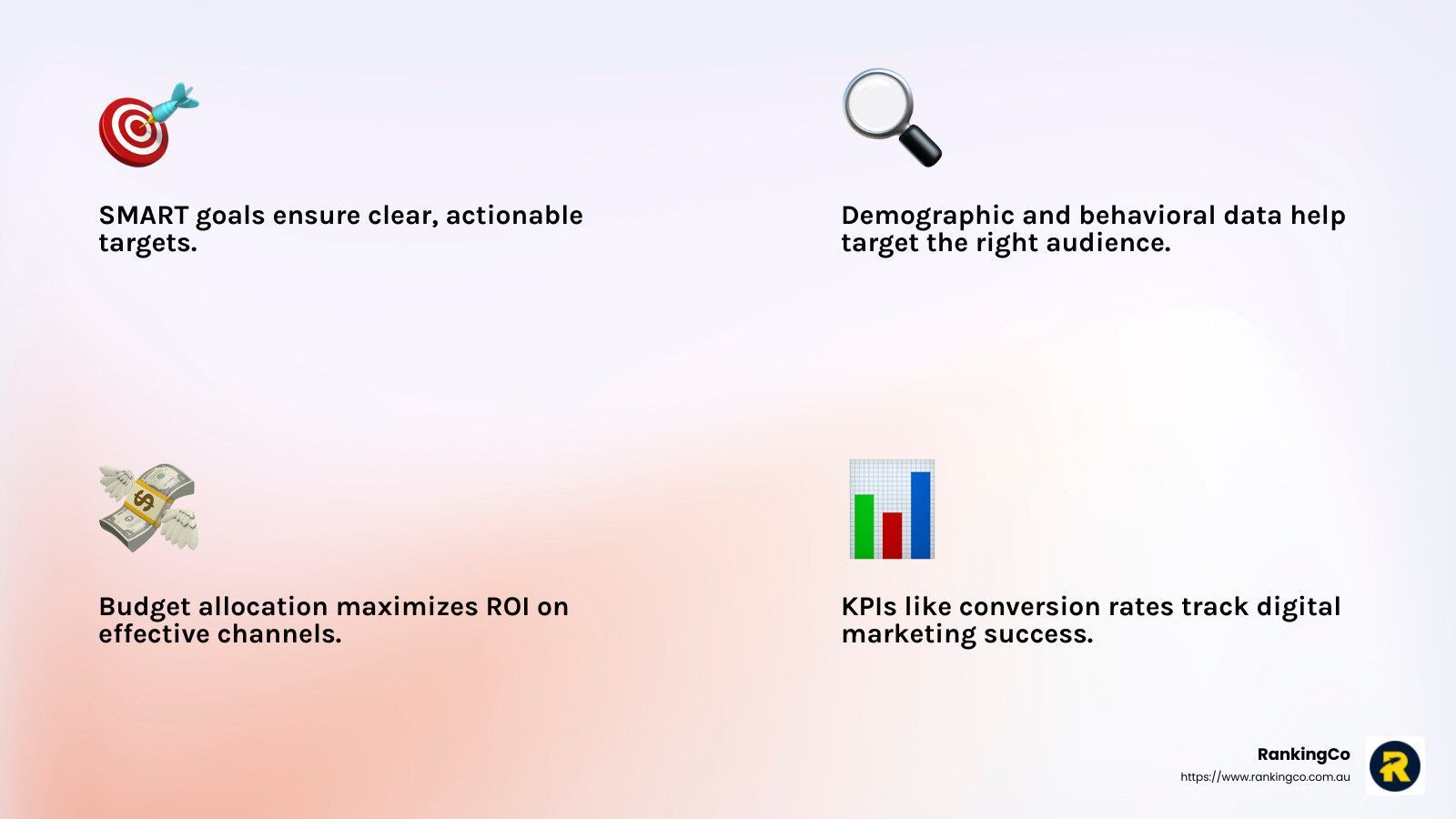
Use Tools Wisely: Tools like Google Analytics and Google Ads provide valuable insights into how your campaigns are performing. Regularly monitor these metrics to identify areas for improvement and make data-driven decisions.
By focusing on these key components, you can craft a digital marketing strategy that not only meets your business goals but also engages your audience effectively. Next, we'll explore how the 5 Cs and 7 Cs of digital marketing can further improve your strategy.
The 5 Cs and 7 Cs of Digital Marketing
When crafting an effective digital marketing strategy, understanding the 5 Cs and 7 Cs can provide a solid framework for success. These concepts help guide your approach, ensuring that every aspect of your marketing plan is well-rounded and impactful.
The 5 Cs
Content
Content is the backbone of digital marketing. It's what attracts and engages your audience. Whether it's blog posts, videos, or social media updates, high-quality content is key to building trust and authority.
Context
Delivering the right content at the right time is crucial. Context involves understanding the environment and circumstances in which your audience interacts with your content. Tailoring your message to fit the context ensures relevance and improves engagement.
Connection
Building a strong connection with your audience is essential. This involves engaging with them on social media, responding to comments, and creating a community around your brand. A genuine connection fosters loyalty and encourages word-of-mouth marketing.
Community
Creating a community around your brand can amplify your reach and impact. Encourage user-generated content, host online events, and facilitate discussions. A vibrant community increases brand visibility and creates advocates for your business.
Conversion
The goal of digital marketing is to convert potential customers into paying ones. This involves optimising your sales funnels, improving user experience, and using persuasive calls-to-action to guide users towards making a purchase.
The 7 Cs
Customer
Understanding your customer is at the heart of any marketing strategy. Gather insights into their needs, preferences, and pain points to tailor your offerings and messaging.
Content
As in the 5 Cs, content remains vital in the 7 Cs framework. It's about creating valuable, informative, and engaging material that meets your audience's needs and encourages interaction.
Context
Again, context is key. Ensure your content aligns with the platform and the audience’s current interests and behaviours.
Community
Building a community is reiterated here, emphasising its importance in fostering brand loyalty and encouraging user engagement.
Convenience
Make it easy for customers to interact with your brand. This includes having a user-friendly website, simple navigation, and clear calls-to-action. Convenience can significantly impact conversion rates.
Cohesion
Ensure all elements of your marketing strategy work together seamlessly. Consistent messaging and branding across all channels build trust and recognition.
Conversion
As with the 5 Cs, conversion is the ultimate goal. Focus on strategies that drive action and lead to measurable results, such as sales or lead generation.
By incorporating the 5 Cs and 7 Cs into your digital marketing strategy, you create a comprehensive approach that addresses all aspects of customer interaction and engagement. This framework not only improves your marketing efforts but also aligns them with your overall business objectives.
Next, we'll dig into building your digital marketing strategy, exploring how to set goals, create buyer personas, audit assets, and more.
Building Your Digital Marketing Strategy
Creating an effective digital marketing strategy involves several crucial steps. Here's how you can start building a robust plan for your business:
Set Goals
Start by setting clear, S.M.A.R.T. goals—Specific, Measurable, Achievable, Realistic, and Timely. Goals provide direction and help measure success. For instance, you might aim to increase website traffic by 20% over the next six months or boost online sales by $50,000 this year. These goals should align with your broader business objectives.
Create Buyer Personas
Developing buyer personas is about understanding your audience on a deeper level. Imagine Janet, a 64-year-old woman from Topeka interested in your products. While Janet isn't real, she embodies the traits of your target customers. Consider their location, income, interests, and pain points. This helps tailor your marketing messages to resonate with them effectively.
Audit Assets
Before diving into new strategies, audit your existing digital assets. This includes your website, social media, and email campaigns. Identify what's working and where there's room for improvement. For example, if most of your website traffic comes from Google, enhancing your SEO efforts could be a smart move.
Plan Content Creation
Content is king. Plan how you'll create and manage content that engages and informs your audience. Consider your budget and resources: Can you handle production in-house, or should you outsource? Use technology like project management tools to streamline this process. Set realistic deadlines to keep your campaigns on track.
Identify KPIs
Key Performance Indicators (KPIs) help track your marketing strategy's success. Examples include conversion rates, cost per lead, and customer lifetime value. Regularly monitor these metrics to evaluate performance and make necessary adjustments. This data-driven approach ensures your strategy remains aligned with your goals.
By following these steps, you lay a solid foundation for a successful digital marketing strategy. Next, we'll explore effective digital marketing strategies for 2025, focusing on emerging trends and technologies.
Effective Digital Marketing Strategies for 2025
As we step into 2025, the landscape of digital marketing continues to evolve rapidly. To stay ahead, businesses must adapt and incorporate effective digital marketing strategies that leverage the latest trends and technologies. Here's what you need to know:
Short Form Video
Short form video is taking the digital world by storm. Platforms like TikTok, Instagram Reels, and YouTube Shorts have made this content type incredibly popular. It's fast, engaging, and perfect for capturing attention in seconds. Businesses that invest in short form video can see significant brand awareness benefits. The key is to create content that's not only entertaining but also aligns with your brand message. Experiment with different ideas and formats to see what resonates with your audience.
Messaging
The shift towards private messaging is a trend that's hard to ignore. More people are sharing content in private DM groups instead of public feeds. Brands that respect this privacy and offer value through messaging can build stronger connections. Consider offering exclusive deals or personalized content through direct messages. This approach can improve engagement and foster loyalty among your audience.
Alternative Platforms
With changes in the digital landscape, exploring alternative platforms is crucial. While giants like Meta and Google remain dominant, niche platforms can offer unique opportunities. These platforms often have less competition and can provide access to specific audiences. Experiment with platforms that align with your brand and audience preferences. This diversification can lead to untapped markets and new customer segments.
Generative AI
Generative AI is changing how marketers create content. Tools like ChatGPT and Google Gemini are not just for copywriting. They can assist in developing digital marketing strategies and plans. These AI tools help generate ideas, optimize campaigns, and even automate repetitive tasks. By integrating AI into your marketing efforts, you can improve efficiency and creativity, giving your business a competitive edge.
Incorporating these strategies into your marketing plan can help you steer the ever-changing digital landscape. Stay tuned as we dive deeper into frequently asked questions about effective digital marketing strategies.
Frequently Asked Questions about Effective Digital Marketing Strategies
What are the 5 Cs of digital marketing?
The 5 Cs of digital marketing are essential for building a strong marketing strategy. They include:
- Content: High-quality content is the backbone of any digital marketing strategy. It attracts, informs, and engages your audience. Think blog posts, videos, infographics, and more.
- Context: Content without context is like a ship without a compass. Understanding your audience's needs and the environment in which they interact with your content is crucial.
- Connection: Building relationships with your audience is key. Use social media, email, and other channels to create genuine connections.
- Community: Foster a sense of community around your brand. Encourage interactions and discussions that make your audience feel valued.
- Conversion: Finally, guide your audience towards taking action. This could be signing up for a newsletter, making a purchase, or any other goal you set.
What are the 7 Cs of digital marketing?
The 7 Cs expand on the 5 Cs by adding more layers to your strategy:
- Customer: Understand who your customers are and what they need. This insight drives all your marketing efforts.
- Content: As mentioned, content is king. It should be relevant and valuable to your audience.
- Context: Deliver the right content at the right time. Personalisation and timing are crucial.
- Community: Build a loyal following that engages with your brand and each other.
- Convenience: Make it easy for customers to interact with your brand. Streamline processes and remove barriers.
- Cohesion: Ensure all parts of your marketing strategy work together seamlessly. Consistent messaging across channels is vital.
- Conversion: Encourage and facilitate actions that align with your business goals.
How can digital marketing help a business succeed?
Digital marketing is a powerful tool for business success:
- Brand Awareness: Digital marketing helps increase your brand's visibility. With strategies like SEO and social media, you can reach a wider audience.
- Customer Engagement: Engage with customers directly through platforms they use daily. This builds trust and loyalty, keeping your brand top-of-mind.
- Sales Increase: Effective digital marketing strategies drive sales. By targeting the right audience with the right message, you can boost conversions and revenue.
Incorporating these elements into your digital marketing plan can significantly improve your business's growth and success. Stay tuned as we explore even more ways to harness the power of digital marketing.
Work with Brisbane's Best!
In the changing digital landscape, staying ahead of the curve is crucial for success. At RankingCo, we leverage AI technologies to keep our strategies cutting-edge and effective. AI allows us to analyse market trends with precision, helping us create campaigns that resonate with your target audience. This technological advantage ensures that we don't just follow trends—we set them.
Our expertise in digital marketing strategies, especially in targeted advertising through Google Ads, Meta Ads, and Bing Ads, positions us uniquely to help small businesses thrive. We understand the importance of local SEO and how it can lift a small business's presence in search engines. By integrating AI, we improve the efficacy of our strategies, ensuring that our clients receive maximum value from their marketing investments.
The digital world is filled with opportunities, but it also comes with challenges. Consumers are inundated with ads and content, making it harder to capture their attention. That's where our approach shines. We focus on creating effective digital marketing strategies that not only reach your audience but engage them meaningfully, driving conversions and building loyalty.
As we look to the future, embracing new technologies and platforms will be key. From short-form video to alternative platforms and generative AI, we are committed to exploring all avenues to keep your brand ahead of the competition. Our goal is simple: to deliver campaigns that are not just effective today but are also future-proof.
Ready to transform your digital marketing strategy? Learn more about RankingCo and how we can help your business succeed in the digital age.








